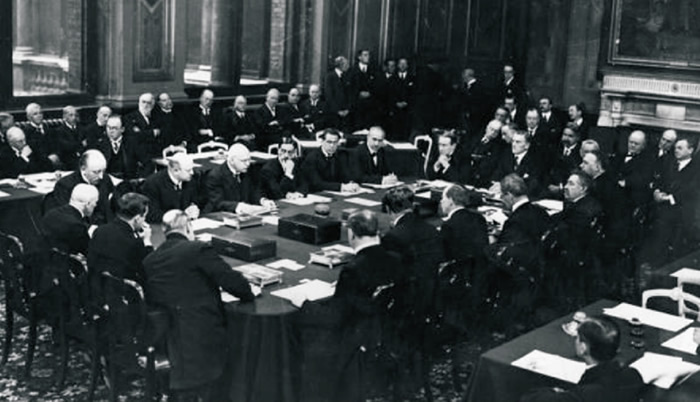 |
| From left to right, Gustav Stresemann, Austen Chamberlain and Aristide Briand during the Locarno negotiations |
The Pact of Locarno, negotiated on October 16, 1925, symbolized the atmosphere of goodwill between erstwhile enemies who had fought a global war 11 years before. The delegates from Germany, France, Great Britain, Belgium, Italy, Poland, and Czechoslovakia met in the city of Locarno, Switzerland.
The preceding months had eased the tension in western Europe. In November 1924 the French had ended the Ruhr occupation. The financial condition of France was not good, and occupation of the Ruhr had become costly. The attitude of France changed after the coming of a new government with foreign minister Aristide Briand (1862–1932).
Briand had softened his earlier stand and had become a "pilgrim for peace." Gustav Stresemann (1879–1929), the foreign minister of the Weimar Republic, was in favor of reconciliation with France. In January 1925, Stresemann proposed a Rhineland Pact, which would guarantee the Franco-German border.
  |
The German acceptance of a demilitarized Rhineland guaranteed the western frontier of France as well as Germany's acceptance of a part of the peace dictated at Versailles. Great Britain was interested in a general peace in Europe for the sake of its commercial and financial interests. The United States had been persuaded by Great Britain to overhaul reparations, and the consequent Dawes Plan gradually stabilized the German economy.
The Locarno Conference began on October 5, 1925. The German delegation was headed by Hans Luther (1879–1962), the chancellor, but most of the work was done by Stresemann. The British foreign secretary, Austen Chamberlain (1863–1937), played an important part in the deliberations at Locarno.
Briand was the delegate from France. Emile Vandervelde
 |
| The Locarno Conference |
The conference continued for 11 days. The diplomats patiently discussed the security of their frontiers in official meetings and informal conversations. Seven treaties came out of the deliberations in an environment of cordiality and cooperation.
The Locarno agreements signaled high hopes immediately. It seemed to erase the bitter memory of World War I. Paving the way for Germany's admission to the League of Nations in September 1926, it gave Germany its due place on the committee of nations.
There was rapprochement between France and Germany. In 1926 Chamberlain, Briand, and Stresemann were awarded the Nobel Peace Prize